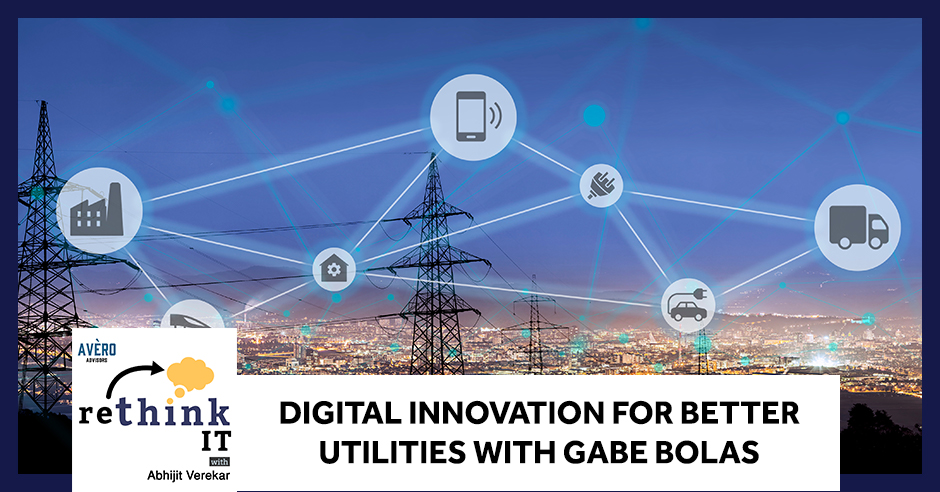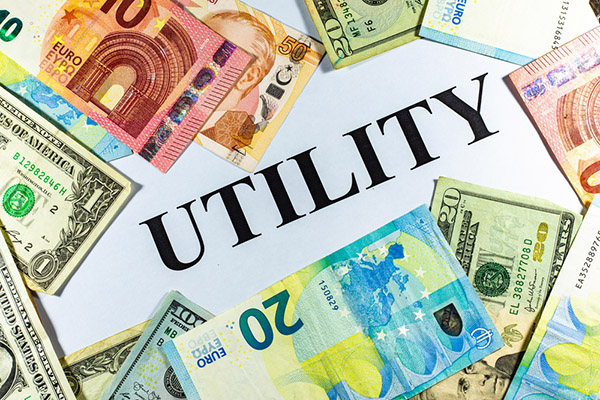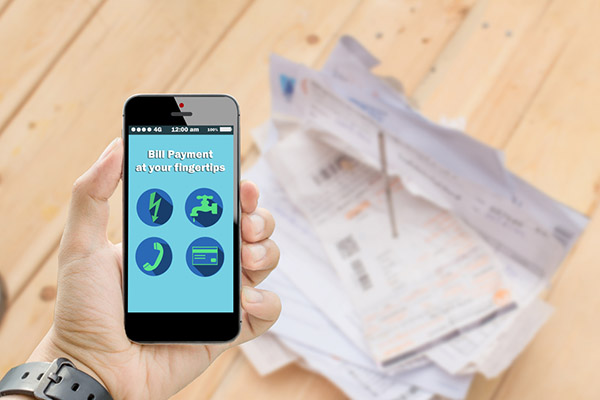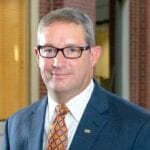Digital Innovation For Better Utilities With Gabe Bolas

In the spirit of delivering more efficient, responsive, and reliable service, utility companies around the country are adopting digital innovations in their systems and physical technologies. Such is the case with Knoxville Utilities Board, whose President and CEO, Gabe Bolas joins Abhijit Verakar for this interview. There is a reason why we take utilities for granted and why we really should – utilities are such basic necessities to our modern lifestyle that excellent service means we can go on living without having to think much about them. Gabe intends to keep it that way, and he sees digital innovation as a way to do more of that for far less. In this conversation, they touch on topics such as the Automated Metering System, Internet of Things, building a KUB app, the CTO role, and the inevitable rise of the internet as the fifth utility.
—
Listen to the podcast here:
Digital Innovation For Better Utilities With Gabe Bolas
My guest is Gabe Bolas from Knoxville Utilities Board. Gabe, welcome to the show.
Thank you. I appreciate you.
You and I have met and we had a wonderful first conversation. I thought, “I must have this guy on the show and spend some time.” Tell me about your story. How did you start and how did you become the CEO of a large utility in the US?
When I went to college, I wanted to be an electrical engineer. My focus was on power systems and utility grade. When I got out of college, I was looking for a job with TVA, utilities like that. There wasn’t much going on in the mid-’90s and most of them were retracting. I was persistent enough and got an opportunity to be at KUB. I started as an entry-level electrical engineer doing basics, simple things. I got the opportunity to work in lots of departments. KUB has four utilities, water, wastewater, gas and electricity. I grew throughout the organization doing multiple utilities, learning all the different ins and outs of utility. Years later, I got an opportunity to be the CEO.
There’s a lot of detail in between there, different positions at different levels, different opportunities. It was cool. I know a lot of folks in the industry, but also at my company. It’s been a neat experience. I tell everybody I’m a recovering engineer because I don’t get to do that anymore. I do enjoy what I’m doing. I enjoy working for the public. We serve a lot of folks. Every day I appreciate what opportunity I’ve been given, and the staff and the folks that have worked for me are phenomenal. We’re working hard every day, but it’s been an easy journey, to say the least.
That sounds like a fascinating journey. You’re a recovering engineer. I don’t think you can ever recover from being an engineer. I think you’re born one and you end up one. Being an engineer, innovation is not something you have to think about. It’s part of life and having served KUB for so long, you’ve seen the agency and the industry evolve to many technological generations. What does innovation mean to you?
We're never done innovating. What's good today will be obsolete in a few years. Share on XFor us, especially on the electric side primarily, but on all utility, it’s about being more reliable. People need us. We’re a basic service, but the reliability is even more paramount than it ever has been. We are using lots of technology to make our system more resilient. The switches and the things in the field now have intelligence to them. They have brains and they can sense problems and faults. We’re implementing that equipment as fast as possible, but it’s taken a learning curve to get there. It used to be a dumb device that did its job but now it’s got cellular technology. It’s got algorithms built into it. It senses things and redirects power around our system quickly and will stay in cycles. That’s been a huge monumental improvement to our reliability. Everything’s digital now. The analogs are gone. We swapped out equipment for new technology faster. Over the years especially, we did a lot of upgrades in the enterprise systems, physical technology, and all of that to make us more efficient, more responsive, and ultimately make us better utility. It’s been crazy, but it’s been great. It’s been fun.
You’re getting more done for less.
An easy example of something isn’t swapped out every meter: gas, water, and electric meters for the automated meter system, AMI. It’s been called multiple things, smart meters. That was 370,000 meters that we changed out over four years. That eliminated our need to have any more meter readers. Now they’re all employed at KUB in other roles, but there are no more people reading the meters. When people are out, we get a notification instantly. We can turn them on or off remotely. That is a simple example of sure savings.
No more truck rolls, no more physically having to do that stuff. Every utility is headed that way. A lot have done it. That in itself is a huge win for us. Savings for the customer, more efficient, more accurate. When someone goes out of power now, instead of calling us like in the old days, we know instantaneously they’re out of power. That’s one example of many things we’ve installed in our our system. We’ve installed towers and repeaters and things that give us more data back quickly that are much more reliable. That right there and alone with this quantifiable data, there’s savings to be had there. Because we’re a utility, all those savings go back to the customer. We don’t have profits. All of our money goes back into the system. It goes back to our customers. That’s one example. There are many more, but that’s the biggest one.
KUB recently upgraded three hundred seventy thousand meters to AMR, that’s a huge undertaking. How long did that take you?

Digital Innovation In Utilities: Utility is doing a lot of changes in its systems and technologies – all geared towards making them more efficient, responsive and reliable.
It took us four years. We started slowly to get it up to speed and then we got rolling in the last years. We did probably 60% of our meters in the last years. We had folks that focused on that. They’re done. It’s been a big win. It’s working. We upgraded our software because of that to be more in line, more in tune with that. Now, we’re getting reports. I get data at my fingertips. That’s so simple to get ahold of it. I can see things in real-time. We’re still learning a lot about it because it’s so new. We’ve taken another leap into making our customers even more reliable. Keeping our costs low and our liability high, that’s our goal. On top of that, things are very safe. That’s what we strive for every day. This stuff makes us much better. What’s good today will be obsolete in a few years, so we can’t go with it and say, “We’re done.” We’re never done. It’s one generation to the next generation.
Two things that come to my mind in all of this technology is data-driven decision–making and providing your customer with real-time data or close to it. I think it’s a huge customer service step. I’m used to knowing exactly how many dollars are in my account or how much of something I’ve used. Utilities and government, in general, tend to be slower in adopting that technology but people expect it now. I’m sure that a reduced number of calls to your call center and customer complaints that come in because people can see what’s going on. You threw out a bunch of terms and technologies out there, AMR, IoT, Internet of Things, smart metering. As you said, it’s ever-evolving and it’s changing quickly. What tools do you have in place to help you keep up with all of that?
That is directly a result of our folks. We have some sharp folks. In the last years, we’ve hired a lot of strong employees that have an IT background. Even your technicians have had some IT background now because they go out in the field and work on this. That evolution has been that folks constantly know that our culture is to get better and to change. If we come across something that either is out there or it looks like it’s something that might apply to us, our customers, we’re all over them. I have lots of folks. We have a whole department of folks that are focused on how to better improve the customer experience. If we see something or hear something, we look into it further.
The next is the Internet of Things, that’s huge. One thing that we’re working on right now that I’m pushing hard is we don’t have a slick app. We have a technology now but it would have an app that is slick. I’ve asked my IT folks, “Let’s build an app. There are a lot of great apps out there. Let’s make a KUB app.” They’re working on that and get that rolled out as soon as possible. That’s a small piece. People can see consumption bills, hourly, daily overlaid with temperature, and things that show anything. That’s on my list of things that we find that the meters change out to do that. Now we need to put it to work. That’s something we’re thinking about.
These young (professionals), I say young which means they’re new, not necessarily young bringing some fresh ideas. That’s what we needed and we’re all about change that makes a lot of sense. You’re right, we are institutionally slower. Part of that is because we don’t want to make a mistake. If we make a mistake, our customers suffer. We‘re going to test the heck out of it, whatever it is, and then pull it out to our customers with that. That’s been our team trend and we need to keep being careful, but we want to evolve to the newer technologies.
It wasn’t meant to be a dig. It’s all by design. You’re moving at the speed of light. At least it seems like it because of how much you have on your plate. Part of your job is to be a visionary and the other part is to be risk-averse. As you said, you’re going to test the heck out of everything. As the CEO, you have a certain vision and you’re like, “I want to have my customers get information at the tips of the fingers. Go make me an app.” How do you keep your folks accountable? I know you have great people on your team. To translate a CEO’s vision to the techie, I think in my head it would be a challenge, but you’re a techie. You’re an engineer. Is it different for you? Can you speak the same language?
There’s no question about whether the internet will become the fifth utility or not. It’s just a matter of when. Share on XSomewhat, even though some things I will tell you, there are some acronyms I haven’t heard or that I can’t figure out. What I did when I first took over as CEO is I created a Chief Technology Officer role. Someone whose world is about technology and all forms of it. He and his department are fully accountable for all the technologies, whether it be internal, external, or both. Part of that was hiring some folks that are in global forward thinkers. They get culture. That’s where the accountability lies. It’s in that division of my company of KUB. Not my company, like the public utility, not my utility. Part of that is having that accountability. What I’m trying to create is that there are no bad ideas out. What’s out there that we’re not doing? What do people want? What do people need? Once again, we’re a basic utility. We’ve been taking for granted for years and we want to be taken for granted. We want the lights to be on when you need it. Now we’ve got to do it better, staying in what do customers need and want. That’s been, I would say a challenge, but it’s a different way of looking at things. We are looking for those things and those wins. We created a portal for instance that people can use to look at the consumption of their utilities.
It’s not been popular as I thought it would be and part of that is they don’t know it’s there. It’s not easy to use, maybe all of the above and so we’ve got to figure that out. That’s why I want this app to be built, to have some people can click on a button on their phone or their iPad and get what they need. It’s easy to understand. If you want to pay a bill or you want to set up some arrangement, it’s all out there at your fingertips. That’s the way it needs to be. Every transaction we all do is electronic. It’s through an app or through Amazon or whatever you use. We need to get that speed and we need to get that done so that we can get more of that stuff out. That’s huge to me personally and it’s important to our customers.
I agree with you, I expect my utility to give me the data that I need. I think you’re thinking the right way. Speaking of things that the public wants, you supply power, water, gas, and sewer systems services. Another thing that is becoming a utility already is the internet. I expect there to be Wi-Fi everywhere I go. You’ve experienced this in your travels around the world. It’s there for the most part. Everybody expects it and we’re at this crucial inflection point where it’s inevitable that it’s going to become a utility. What are your thoughts and how is KUB preparing for that?
I’ll answer it in two parts. One is for many years and I say for the last decade, we didn’t want to get into the business of our private partners, the private sector, which is the Comcast, AT&T, Charter Spectrum. There’s a bunch of players in this area. We want not to be in their business. We didn’t want to compete with the private sector. That was over the last years. As you’ve put it well, and I agree with you 100%, the internet is what electricity was 100 years ago. Electricity was a massive thing and now it’s a necessity. The internet has now become that thing. We now, for the first time, are having conversations about, “Is it appropriate for KUB to step into that, to get in that business?” That will create a fifth utility for us.
There’s no doubt it’s independent of the other four. Even though it may use the same poles, it’s got to stand alone as far as the utility. We are for the first time, looking at the possibility of doing that where you’re getting a lot of customers that are asking for it, they’re expecting it. There are areas of Knox County, even as big as Knoxville that have little to no service. There are not as many there used to be, but we also serve our six other counties that are rural and don’t have all the choices. The question is good in the sense that yes, I think it’s something people expect like electricity, to have internet access, good high-speed internet access.
I think COVID opened our eyes to that a lot more. Work from home, telemedicine, and schools. It went on steroids the last months working the internet. I will tell you, we are going to seriously look at it. It’s a huge lift financially and physically. I think the role is we’re now realizing and we know we all have to have the internet connection. We have to have a dependable high-speed internet. Our house is run on them. I’m automating everything. It’s the way it is. When my light bulbs come on, my heat and air works, my garage opens and closes, my doors unlock themselves. All of that technology is critical now. We’ve got to be a part of that solution, it sounds like. We’ve got to figure it out or at least have a reason why we’re going to do it or not going to do it. That’s the future. I think it’s coming. It’s a matter of when.

Digital Innovation In Utilities: Utility is not going away; it’s going to evolve.
I love my automation. We got a Roomba and it’s vacuuming while I’m doing this call at the same time. There are solutions out there, we just need to find the right one. Has COVID been the biggest challenge in your career as an engineer or not even as a CEO, a top executive as a utility?
It’s hard to say because I will say our folks are still busy. It’s been unique in the sense, I know for a fact that our customers are struggling to pay the bills because of the lack of jobs. That’s huge and we’ve never seen like this happened this fast. Knoxville is at 10% to 12% unemployment, which is when it was 3.3% a couple of months ago. That’s been a shock. Even those who have jobs had cut in pay or have lost some of their tips or their benefits. We’re seeing real folks, real business even on top of that struggle to pay their bills and we’re trying to figure that out with them. We have suspended disconnects for as long as we possibly can to help those folks out.
That’s been unprecedented. I’ve never could imagine something like this happening this fast. Even the Recession in 2008 didn’t happen in one month. It happened over a period of time. This has been unique. It’s more about not our delivery of service. It’s been reliable as it has been, but the fact that our customers are struggling so much. It has been something we’re trying to figure out how to help assist and keeping the lights on. Our crews in the field who are doing work, we’ve done all that we can to keep our folks safe, PPE to social distancing to the mask. All the things we need to buy, we bought. They’ve been good at keeping themselves away from each other.
They’re still responding to every event that we have that from that point of view, that’s not changed. It’s made it different with the Team meeting or a Zoom meeting. We still are to serving our customers. Our customers are feeling it and we’re seeing it firsthand. I don’t know what the next few months look like, but right now, things aren’t looking good. I hope it can get better in the short–term. We’re going to keep around that and that’s been the biggest thing I’ve seen. It’s a lot of people hurting out there. You’ve got 60,000 kids that got to get to school or get internet access, we’ll see how. We will find out quickly if we don’t have what we need in certain areas. That’s the reality of it and like I said, I think the work from home has been interesting. We’ve been able to do it in some cases, but it’s not busy as we thought it would be either. There’s a challenge to it.
It’s been a lifesaver, but I don’t think our economy would have survived without this ability underlined everything that we talked about that I need to find a way to connect people. You might think, “Why KUB? Why electric?” You guys have wires running all over the place and you’re the vehicle for it. You need to find a way to leverage what you have and use the fiber network to the most. Anything else you want to discuss or bring up?
No, I appreciate you having me. I said the technology realm and everything that we do nowadays is affected by technology. Even the future of electric vehicles, all that technology, which integrated. It’s all going to be integrated into our system so we got to figure all that out. I’m not worried about it. I think we should be worried about it. I’m excited about it. I’m embracing it. I think the utility sector will evolve. It won’t go away. We’ll evolve to figure it out but that’s part of who we are going to be. We’re owned by the public. We’re run by the public, but as the SF gets brought on board, we need to be embracing it and figuring out how we be a part of the solution and making it easier for us. That’s where the engineer comes out. It’s who we are. Solar panels to windmills, to self-generation, all that’s coming. Bring it on. Let’s do it.
What a good time to be alive. I’m not an engineer, but I have this childlike thrill about new technology that you seem to have. I can’t wait to see more. Thank you for coming to the show and I look forward to our conversations in the future.
Thank you. I appreciate you having me.
Important Links:
About Gabriel Bolas
 Gabe Bolas, President, and CEO of KUB earned his Master of Science in Industrial Engineering and Bachelor of Science in Electrical Engineering at the University of Tennessee. He is a Licensed Professional Engineer. At KUB, he has served as Manager of Engineering Systems, Environmental Programs, and Overhead Construction and Assistant to the Chief Operating Officer. He is a member and past president and state director of the Tennessee Society of Professional Engineers, receiving the Young Engineer of the Year award in 2001 and the Engineer of the Year award in 2013.
Gabe Bolas, President, and CEO of KUB earned his Master of Science in Industrial Engineering and Bachelor of Science in Electrical Engineering at the University of Tennessee. He is a Licensed Professional Engineer. At KUB, he has served as Manager of Engineering Systems, Environmental Programs, and Overhead Construction and Assistant to the Chief Operating Officer. He is a member and past president and state director of the Tennessee Society of Professional Engineers, receiving the Young Engineer of the Year award in 2001 and the Engineer of the Year award in 2013.
In the community, Bolas is a member of the Leadership Knoxville class of 2018 and currently serves on the boards of Habitat for Humanity and the Sertoma Center. He is a founding member of the United Way of Greater Knoxville’s 1922 Society. He has worked closely with various environmental and development groups to create relationships between KUB and the environmental community, as well as attracting new industrial employers to the area. He served on the team that was instrumental in securing a $15 million grant for weatherization of Knoxville’s low-income homes.
Bolas and his wife, Tarah, are parents of three sons, Gabriel III, Zander, and Avery.
